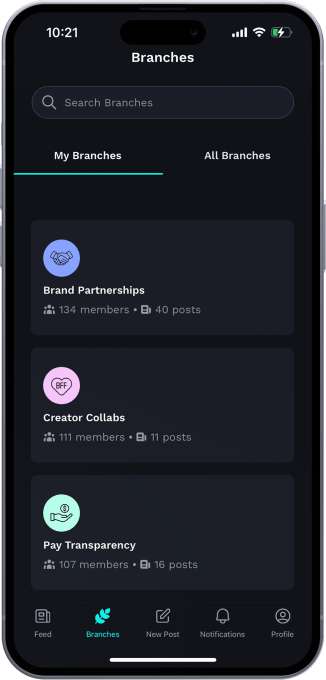Canopy is a new peer-to-peer social networking app for content creators to connect, crowdsource information and, for lack of a better term, “spill the tea.”
The company announced today the launch of its pilot program, with plans to onboard 1,000 influencers. Canopy hopes that the program will help “build critical mass on the platform in our core content niches: beauty, fashion and lifestyle,” Ayomi Samaraweera, Canopy founder and CEO, told TechCrunch.
To get early access, creators can sign up on Canopy’s website. There are currently 1,200 people on the waitlist.
In addition to the pilot, Canopy will test three potential monetization paths, including a monthly subscription service that offers educational resources like a webinar series, in-person events and accountability groups. The company will also experiment with a research marketplace that connects brands with creators as well as a community management section for talent agencies and companies.

The app is open to all types of creators, such as pop culture, gaming, food or even those that post adult content. However, Canopy primarily targets beauty, fashion and lifestyle creators because “those are the content niches that have the highest earning potential and spending power,” Samaraweera explained. “Therefore, those types of creators are [usually] people who take it seriously and want to build a full-time career out of it.”
Canopy accepts influencers from most major platforms, including TikTok, Instagram, YouTube, Twitch, Facebook, OnlyFans, Pinterest, LinkedIn and Snapchat. Currently, the required follower count to join Canopy is between 1,000 and 100,000. However, it’ll be open to all creators in the future.
Like Reddit and X (formerly Twitter), Canopy has features you would expect with a social networking app: posts, comments, likes, profiles and so on. Users can also join “Branches” or groups that focus on a certain topic, such as brand partnerships, pay transparency, industry news, mental health, events & programming, monetization opportunities, platform algorithms, talent agencies and more.
Notably, everyone is anonymous on Canopy in hopes of fostering a safe space for creators to share their frustrations about the industry and ask questions without fear of judgment. All that users know is where they are from and what type of content they create. For example, an account name could be “NY Fashion Creator.”
When speaking to creators, Samaraweera found that they liked the sense of anonymity on the app because they don’t want to “damage their own careers or upset anyone” if they want to share a bad experience with a brand or warn others about a potential scam. It’s also helpful for new and rising creators to learn more about the space, make friends with people in the industry and build up their network.
“There doesn’t need to be so much hierarchy and gatekeeping,” Samaraweera said. “One in four Gen Zers want to become a content creator, but there’s no college degree or clear path on how to do that,” she added, citing a 2022 survey from HigherVisibilty.
The app also has a branch/group called “Creator Collabs” where creators can be more open about their identities and arrange in-person meetups. Canopy plans to introduce a toggle feature at the end of October, letting creators choose between staying anonymous or revealing their real names.

Additionally, Canopy plans to launch a reward system called “Aura Points” at the end of the year that rewards creators for responding to posts, sharing useful information and writing posts that get a lot of engagement. The points can be redeemed for creator tools, editing equipment and subscription services that help enhance their skills.
Not only is Samaraweera an ex-TikTok employee, having worked in internal communications, but she’s also a TikToker with more than 25,000 followers. Most recently, Samaraweera worked at creator growth company Jellysmack as the chief of staff to the president, where she gained valuable insights about the creator economy.
Samaraweera developed Canopy to address the issues that she experienced herself when growing her TikTok audience.
“When I was making content, it was a very painful journey,” she said. “I was able to grow my account, but when I was doing it, I remember thinking, ‘This is so hard.’ It’s also very lonely… so much of being a creator is learning through trial and error. I believe this process can be sped up if we share information with each other.”
The company is backed by Hustle Fund VC, the founders of Jellysmack and Sean Atkins, president of Jellysmack. Plus, Canopy was recently accepted into Techstars Seattle. In total, Canopy has raised $240,000.































Comment